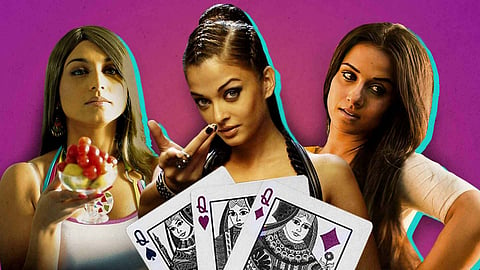
- Reviews
- Power List 2024
- Cannes 2024
- In-Depth Stories
- Web Stories
- News
- FC Lists
- Interviews
- Features
- FC SpecialsFC Specials

Shaan (1980), with Amitabh Bachchan and Shashi Kapoor running circles around unsuspecting people, looks like any ordinary con film until Parveen Babi’s Sunita shows up. Her introduction is through a dance number. Sunita sings and enraptures the crowd. It seems like she’s doing what most heroines do in such a film: Entertain. A necklace goes missing from the neck of a premier guest and we assume it’s the work of the two heroes. A security check is ordered to find the necklace and the camera briefly – and tellingly – pauses on Sunita’s face. The film presents her as not only a glamorous schemer, but also an equal match for the film’s male protagonists. Sunita is one of the early pioneers of conwomen in Hindi cinema and we have had some memorable additions to that tradition in recent years. Here are some of our top picks.
Aishwarya Rai Bachchan plays Sunehri in Dhoom 2 – sensual, smart and often distractingly annoying (She uses ‘like’ in every other sentence. It was 2007). She flies into A’s (Hrithik Roshan) radar not only because she’s as good a thief as he is, but also because she has pulled off a heist and left behind his signature – a metal ‘A’ that he left behind as a taunt at his crime scenes — to divert the police’s attention. Rai Bachchan’s ravishing avatar was a revelation when the film was released (who didn’t vibe to “Crazy Kiya Re”?) but it was her turn as a key player in the plot that made her performance truly enjoyable. Not only is she a competent companion to Roshan’s A, her ever-shifting allegiances – initially with the cops who plant her in A’s life and later with A himself – often move the plot forward.
Bunty may get the primary credit in the title, but thanks to Rani Mukerji’s electric performance, Babli is the one who adds wicked sass to Bunty Aur Babli. In one of their cons, Bunty (Abhishek Bachchan) convinces an excited foreigner that the Taj Mahal is for sale. To seal this deal, the foreigner is presented to Babli (Mukerji), posing as the stern minister, Phoolsakhi. Mukerji is a rip-roaring delight in her puffer-jacket-with-saree look, nonchalantly informing the American that she cannot sell the monument to him, but he can “kiraye pe lez it (rent it)”. For the small price of 250 million (the denomination is neither revealed nor does it matter), of course. From the small town of Pankinagar, Babli would rather be Miss India than be married to some government babu. But she finds her calling in crime, becoming one of those rare Hindi conwomen who are in the game simply for the fun of it.
Yes, we know. Krishna, played by a scene-stealing Vidya Balan, isn’t exactly a conwoman. She isn’t after money or fame but rather the burning satisfaction of revenge. But nobody can deny that she is a crafty scamster. Krishna’s character capitalises on Balan’s ability to convincingly play both saint and sinner. She uses these two personas to beguile the loafers shacking up in her home – Khaalu jaan (Naseeeruddin Shah) and Babban (Arshad Warsi) – and gets what she wants. Krishna might not be pulling off heists like Babli or Sunehri, but she’s winning her own games of lust, loins and loot.
Abhishek Chaubey’s second installment has many more plotters than the first. Khalujaan and Babban make a return, now in cahoots to impress Begum Para (Madhuri Dixit) and her aide, Muniya (Huma Qureshi), so that the four can live lavishly on the deceased Nawab’s wealth. Although we know that Khaalu and Babban are no aristocrats, it is later revealed that Begum Para isn’t a queen. There is no royal wealth to be enjoyed, only debts that the Nawab left behind. However, there is a priceless necklace that changes hands, and Begum Para and Muniya make sure that they’re the last ones holding it. Dedh Ishqiya’s ending consists of a cheeky letter of thanks from the duo to Babban and Khaalu, hinting that the Begum and Muniya are – and always had been – lovers. Nothing like a double con.
The chief con in Ladies vs. Ricky Bahl is a man (played by Ranveer Singh), as is the case for most films of the genre. Ricky has pulled a fast one on many ladies with his easy charm and quick brains and it is no surprise that some of them get together to con him back. Their key player is Ishika (Anushka Sharma), a terrific saleswoman, who agrees to pose as a millionaire heiress. Although much of Ishika’s deception revolves around having chemistry with Ricky, her scam act still makes for a fun watch.
Reportedly inspired by true events, Dolly Ki Doli follows Dolly (Sonam Kapoor) duping multiple men by marrying them and running away with their money. This “looteri dulhan” (as she is described in the film) is unabashed in her exploits, flirting and fleecing with equal panache. Dolly Ki Doli might follow a similar narrative trajectory as most con films but it’s one of those rare ones that ride on the shoulders of a sole woman. Even better, its ending refuses to make a heroine out of its anti-hero, letting Dolly remain loyal to her tricks rather than the man who saves her from trouble.